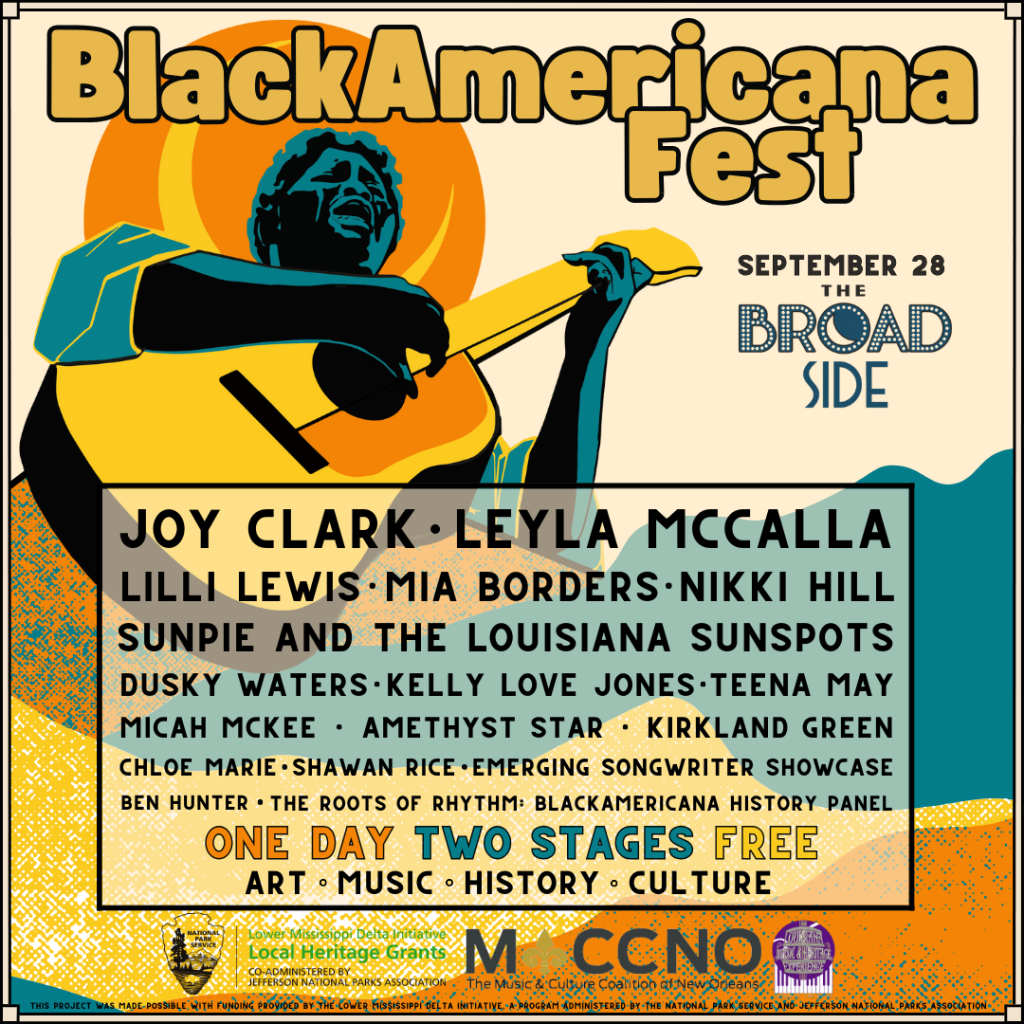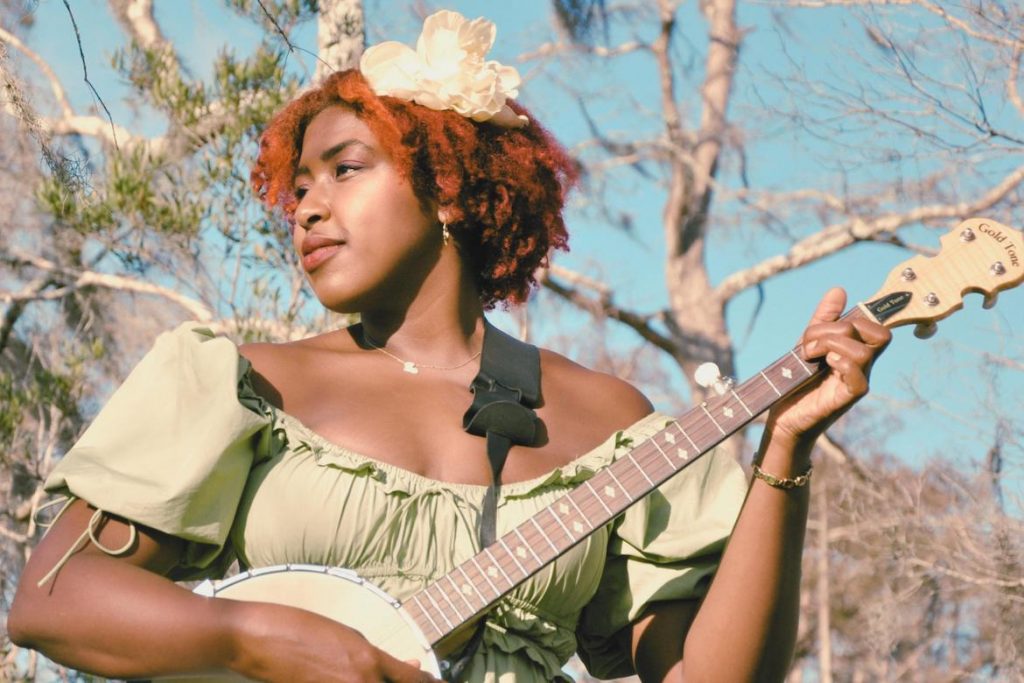“I consider her to be like my musical fairy godmother, mentor, Superwoman,” BlackAmericana Fest co-founder Jenn Jeffers AKA Dusky Waters enthuses about fellow Americana singer-songwriter Lilli Lewis, who will be performing the inaugural festival on September 28th. The two met when Dusky was a brand new artist in New Orleans a decade ago looking to connect with other women making Americana and folk music. Dusky, like Lilli, is a multifaceted artist and advocate with a rich background in Americana music and a deep commitment to equity and inclusion. “Lilli has just been so good to me. She’s been a guiding light if I need help or advice,” she continues. And Lilli, like Dusky, provides participants with a space of community and support as black musicians.
Lilli founded the Black American Music Summit at Folk Alliance International, a miniature conference in which Dusky is known for her role as an organizer. “I really got to learn from her leadership in that space as well which has been really cool. And some of those learnings actually have translated into the planning for BlackAmericana.” Both events aim to broaden the representation and inclusivity within the Americana, folk, and country genres.

As a talented banjoist, songwriter, and educator, Dusky has made a significant impact in the New Orleans music scene over this past decade. Her active performance career includes several successful national tours and appearances at major festivals, showcasing her dedication to her craft and her mission to foster a more inclusive music community. Dusky grew up exposed to gospel, soul, and pop in a land where folk music thrives: Little Rock, Arkansas. “I was in piano lessons and they were like, ‘You have to take piano because that’s what people do in our family.’ But I really wanted to take guitar lessons and start writing my own songs. So I think it was around 10 or 11 that I started listening to more indie rock. I think about all the badass women songwriters of the early 2000s. And then I transitioned later, around the time I was in college, when I started listening to folk and country music in a more earnest way. I saw the Carolina Chocolate Drops play in St. Louis. Rhiannon Giddens is someone I admire so much. At that concert she spoke about the black history of folk music and the banjo, and I just fell in love.”
When Dusky first picked up the banjo, she was living in Missouri, and her introduction to the instrument was through bluegrass and string music. But along the way she has learned more about its endless possibilities, and has unlocked its potential as an instrument that can exist in other ways beyond traditional bluegrass. When she met BlackAmericana co-founder Teena May about a year and a half ago they were both attending another small grassroots festival in Louisiana called Fete Du Void. Dusky already had an idea percolating in her mind for years. She loved being an Americana and folk artist in Louisiana, but it was also important to her to meet other people who looked like her who had similar stories.
“So meeting Teena was cool because it’s another black singer-songwriter who’s making country and folk music. So I was like, ‘Hey, I’ve had this idea for a long time about having this thing called Black AmericanaFest. I want to have a space for us so that we know that each other is here and we can connect. I think that when people think about New Orleans, Americana and country music is not what comes to mind. We really wanted to think about where our music sits in the landscape of New Orleans. How would we create a space to celebrate that? And then, we were really interested in history. Learning about the history of the banjo unlocked something critical for me. We really hope to be able to unlock that in some other people as well. So we were like, how do we put this together? That was sort of the inception of BlackAmericana Fest. We’re leading up to the fest, but the journey of talking to community partners about the festival – everyone we met has been so excited. It’s either been like, ‘Oh my gosh, I didn’t know this was a thing’ or ‘Yes, this makes total sense.’ Something that happened in our planning process is that Beyonce released the country album. We were already talking to people in planning the fest, and then that happened. So that was another huge moment and another sort of avenue to put people into the idea of black folk in this genre.”
Any time there is talk about the history of the banjo, Dusky has seen light bulbs go off in people’s heads. But more than tracing instrument origins, she and her team are putting together as part of the festival a music history panel with New Orleans scholars who are experts in musicology and the region’s music history. “I’m actually super excited for that part of the festival and everything we are going to learn.” Dusky takes a lot of inspiration from Elizabeth Cotten and Sister Rosetta Tharpe, or as she puts it, black women with guitars and banjos. Sister Rosetta Tharpe in particular is the heroine she thinks about most, both for her style of playing and songwriting, but also for how bold and unapologetic she was at a time when it was dangerous for black women to be.”
In addition to the soulful sounds of Lilli Lewis, Joy Clark, Nikki Hill, Dusky Waters, and Teena May, the mainstage will find Leyla McCalla bringing her unique blend of folk, Creole, Cajun and Haitian influences. The lineup will also feature headlining performances from zydeco favorites Sunpie and the Louisiana Sunspots and renowned singer-songwriter Mia Borders. Their Narrative Sights and Sounds stage will prove to be a great platform for new songwriters to gain exposure. “There will be a main stage outdoors with our band performances, but we are also really excited to highlight up and coming songwriters in Black Americana. We’re going to have a series of Songwriters in the Round featuring black songwriters from around South Louisiana. I’m very pumped about that.”
The featured songwriter set by Kelly Love Jones as part of this series really goes back to their mission of honoring this region brimming with creativity. “We understand that there are so many artists around the world making music, and Black Americana, but we actually just want to focus on New Orleans and the Mississippi River Delta region and showcase the talent and history that we have here.” With a growing wishlist, the goal is to invite one or two national acts alongside a roster of local artists. “Allison Russell is someone who I’ve thought about, of course. We are excited to see how the festival grows and expands.”
It’s no secret that Black communities have created many influential roots artforms across various genres, but overlooked and yet at the same time most broadly defined is Americana. With blue notes, lyrical themes of hardship, instrumental techniques, emotional depth and stylistic diversity, blues and Americana actually deeply influence one another. “It’s been a long journey,” Dusky replies when asked to describe what it’s been like claiming her place within Americana. “I would say growing up I didn’t always see people who looked like me playing the types of music that I was interested in. And that left me with the feeling that maybe I didn’t belong. I think a lot of people have felt this way. Is country music something I can be a part of? Is bluegrass? Is folk something I can be a part of? I honestly think it was, you know, being undereducated in the history of my people in these artforms.
“So as I began to learn more and delve into the history, find out about artists like Elizabeth Cotten, read books about Sister Rosetta, and start to uncover the black history of the banjo, I started to feel more at home in the music that I really wanted to create. I do belong here. This is a part of my history. This music belongs to me, too. And I can create in this genre and still be authentically me and still be authentically black. Because I think the additional hurdle that black artists have in many spaces is when you create things that maybe aren’t typically associated with your culture, maybe feeling inauthentic in a way even if that’s not actually true. I’m going to make this music because it is the authentic representation of myself and my experience. I’m still authentically black in my expression, in this artform.”
This is exactly the message Lilli Lewis was trying to send with the release of 2021’s Americana album. “In the genre, a lot of stories get left behind. I wanted to give voice to some stories that might not be included in the lexicon of American stories, and yet we’re listening to them every day,” she told me in an interview. Americana is the album title because its stories and sensibilities are foundational to American music, but along the way, musically and otherwise, she started to realize that the definition depends on who you are asking.
Dusky elaborates, “I think a lot of what we’re aiming to do with the festival is important: representation matters. Especially for people with marginalized identities. You can’t become what you can’t see. I think the more of us that are creating art in these spaces, that are taking up space in these places – that is a great way to live and lead by example for the generations coming up behind us. I also think mentorship is important. Something I’ve appreciated so much about Lilli is every time a door has opened for her, she’s also left that door open for our people coming behind her. She has been someone who has been a connector in our community, and has been unapologetically loving and supportive of other artists. We could all live by that example.
“Oftentimes Black Americana artists are stepping into spaces that are predominantly white, that are predominantly run by men still, who may not necessarily believe that I belong there. But I’m coming in with my own personal deep belief that I do belong. My music is Americana music; it is a deep expression of my lived experiences, but also of everyone who’s come before me.”
Join this one-day, free festival on September 28th at The Broadside Nola in the historic Tremé neighborhood! “I have played there before many times. It’s a wonderful venue. The reason we chose Broadside is for a few reasons: one, it’s in the Tremé neighborhood – historically black neighborhood, the birthplace of jazz. When we think about connecting to our history, we really want to be in that space. It’s sort of an all inclusive campus with two stages, a restaurant, and spaces for vendors. It’s a really great atmosphere to host the event. We love the Broadside and we’re very excited to be there.” More info here.


